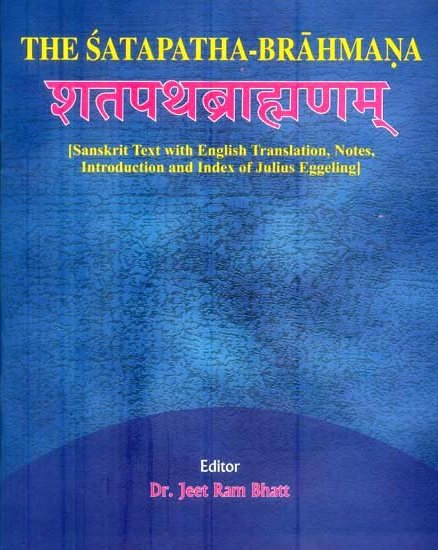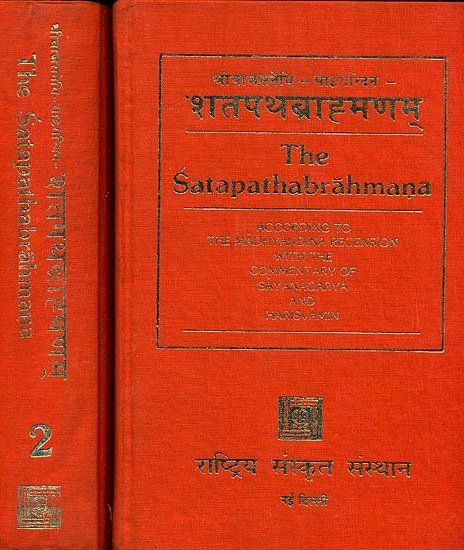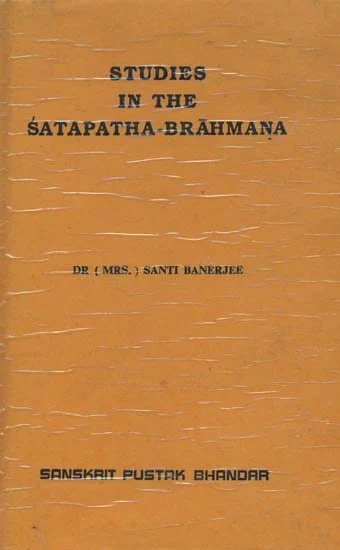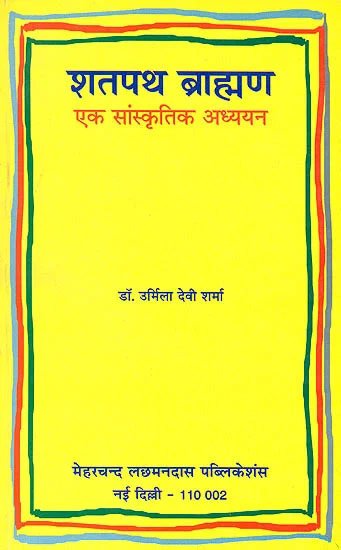Satapatha-brahmana [sanskrit]
147,532 words | ISBN-10: 812080113X | ISBN-13: 9788120801134
The Sanskrit text of the Satapatha-brahmana: One of the largest works in the category of Vedic (Brahmaic) literature, narrating in extensive detail the various rites, constructions, chants and utensils to be used in Hindu ceremonies. Alternative titles: Śatapathabrāhmaṇa (शतपथब्राह्मण), Śatapatha-brāhmaṇa (शतपथ-ब्राह्मण) Shatapathabrahma (shatapatha).
Verse 1.8.3.27
yujau ha vā ete yajñasya yatsrucau | te etadyuṅkte yatpracarati sa yaṃ nidhāyāvadyedyathā vāhanamavārcevaṃ tatte etatsviṣṭakṛti vimocanamāgacataste tatsādayati tadvimuñcati te etatpunaḥ prayuṅkte'nuyājeṣu so 'nuyājaiścaritvaitadvimocanamāgacati te tatsādayati tadvimuñcati te etatpunaḥ prayuṅkte yatsampragṛhṇāti tadyāṃ gatimabhiyuṅkte tāṃ gatiṃ gatvā vimuñcate yajñaṃ vā anu prajāstasmādayam puruṣo yuṅkte'tha vimuñcate'tha yuṅkte tadyāṃ gatimabhiyuṅkte tāṃ gatiṃ gatvāntato vimuñcate sa sādayati ghṛtācī stho dhuryau pātaṃsumne sthaḥ sumne mā dhattamiti sādhvyau sthaḥ sādhau mā dhattamityevaitadāha
Preview of English translation:
27. Yoke-fellows, indeed, are these two spoons for the sacrifice: he yokes them when he starts (or, first uses them). Now, were he only to release (unyoke) either of them after putting it down, it would fall down just as a draught animal (would, if made to lie down before being unyoked). At the Svishtakrit these two undergo an unyoking: he then lays them down, and so unyokes them. He then yokes them again, at the after-offerings. Having performed the after-offerings, he effects another unyoking: he lays them down, and so unyokes them. Thereupon he yokes them again when he seizes them both at the same time; and when he has travelled over the way for which he has yoked them, he unyokes them. After the sacrifice offspring (is produced). Hence this man yokes (unites), and then unyokes, and again yokes them; and when he has travelled over the way for which he yoked them, he finally unyokes them. He lays (the spoons) down, with the text (Vajasaneyi Samhita II, 19 a), “Fond of butter are ye; protect the two yoke-fellows! gracious are ye: lead me to grace!” whereby he says, “good are ye: lead me to goodness!”
For a detailled translation, including proper diacritics and footnotes, go the full English translation.
Other editions:
Also see the following editions of the Sanskrit text or (alternative) English translations of the Satapatha-brahmana Verse 1.8.3.27
The Satapatha Brahmana (In Five Volumes)
by Julius Eggeling (1882)
2551 pages; [Publisher: Motilal Banarsidass Publishers Pvt. Ltd.]
Buy now!
The Satapatha Brahmana (3 volumes)
by Dr Jeet Ram Bhatt (2009)
Sanskrit Text with English Translation; 1726 pages; [Publisher: Eastern Book Linkers]; ISBN: 9788178541693
Buy now!
The Satapatha Brahmana (With The Commentary of Sayanacarya and Harisvamin)
by Rashtriya Sanskrit Sansthan (2002)
3483 pages; [शतपथ ब्राह्मणम्] According to the Madhyandina Recension; Commetaries: (1) Vedarthaprakash (Vedartha-prakasha) by Shrimat-Trayibhashyakar Sayanacharya, (2) Sarvavidyanidhana Kavindracharya Saraswati.
Buy now!
Studies in the Satapatha-Brahmana
by Dr. (Mrs.) Santi Banerjee (1993)
236 pages; [Publisher: Sanskrit Pustak Bhandar]
Buy now!
Cultural Study of the Satapatha Brahman (in Hindi)
by Dr. Urmila Devi Sharma (1982)
106 pages; Shatapatha Brahmana Ek Sanskritik Adhyan; [Publisher: Meharchand Lakshmandas Publications]
Buy now!![Satapatha-brahmana [sanskrit] - book cover](/uploads/a/NAC457-Satapatha-Brahmana.jpg)



